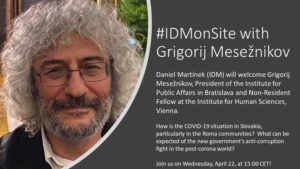
The way Russian pro-governmental media approached Hungary’s “coronavirus coup” stand-off with the EU in the time of COVID-19 is in line with the outlets’ long-term attitude towards Hungary, notes Grigorij Mesežnikov, (above), a political scientist and the President of the Institute for Public Affairs (IVO) in Slovakia.
They describe it as the most Russia-appeasing of all EU member states; as an advocate of close economic cooperation with Russia, a strong critic of European sanctions against Russia, as a champion for its own sovereignty against an unjust Brussels, and as Russia’s ally in its conflict with Ukraine, he writes for Visegrad Insight, a partner of the National Endowment for Democracy (NED).
Russia’s response to initiatives to honor democrat Boris Nemtsov, who was shot dead near the Kremlin in 2015. demonstrate that the regime, a lawless kleptocracy, is a residue of the Soviet Union and a successor to the Soviet Union’s Leninist party-state, the Washington Post’s George Will observes. China’s regime is also such a state, and is determined not to have a successor. Today’s world contains crude political menaces more durable and potentially more dangerous than a virus, he adds.
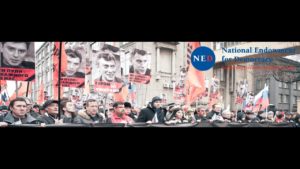 The Kremlin’s reaction to the Nemtsov commemorations might go beyond words, notes fellow dissident Vladimir Kara-Murza. It was revealed this week that Prague Mayor Zdenêk Hřib who had authorized the Nemtsov Square designation has been placed under police protection after Czech intelligence got information about an individual arriving in Prague with Russian diplomatic papers and a suitcase containing the lethal poison ricin. (The same KGB-supplied poison had been used to assassinate Bulgarian dissident journalist Georgi Markov in London in 1978.) The mayor has said that he is not at liberty to disclose the details of an ongoing security operation, he writes for the American Interest.
The Kremlin’s reaction to the Nemtsov commemorations might go beyond words, notes fellow dissident Vladimir Kara-Murza. It was revealed this week that Prague Mayor Zdenêk Hřib who had authorized the Nemtsov Square designation has been placed under police protection after Czech intelligence got information about an individual arriving in Prague with Russian diplomatic papers and a suitcase containing the lethal poison ricin. (The same KGB-supplied poison had been used to assassinate Bulgarian dissident journalist Georgi Markov in London in 1978.) The mayor has said that he is not at liberty to disclose the details of an ongoing security operation, he writes for the American Interest.
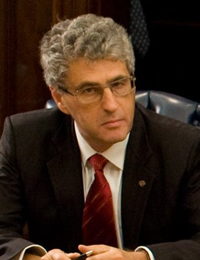
National Endowment for Democracy (NED)
“No Russophobe . . . could bring more shame on Russia than our own Foreign Ministry,” political analyst Leonid Gozman (right) wrote after the news of the Prague embassy address. “The embassy . . . has publicly confirmed that Nemtsov is an enemy, that even his memory frightens them. Such [a] position is only logical if he was killed on the orders or with the connivance of the present authorities.”
Incompetence, impatience, and impotence were the three factors that contributed to the Soviet Union’s collapse — and they are present in Russia now. Vladimir Putin should be worried, argues @cepa analyst @edwardlucas.
This does not mean that the Putin regime is doomed, he adds. The Soviet Union was bankrupt. Russia is not: it has $600m in its coffers. It can squeeze more from the pockets of oligarchs and big business. It could even borrow abroad. The Kremlin is also far more politically resilient than it was in the Gorbachev era, when communist officials found independent thought and action baffling.
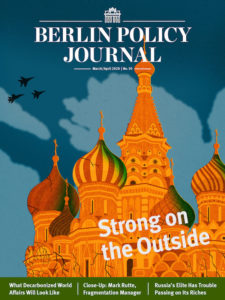 To meet the challenges posed by the autocratic resurgence, the transatlantic democracies must position themselves to shape the post-pandemic order, the International Republican Institute’s Jan Surotchak and Daniel Twining write for the Berlin Policy Journal:
To meet the challenges posed by the autocratic resurgence, the transatlantic democracies must position themselves to shape the post-pandemic order, the International Republican Institute’s Jan Surotchak and Daniel Twining write for the Berlin Policy Journal:
- First, they must ensure that temporary measures limiting basic freedoms put in place to limit the spread of the virus remain just that: temporary. Emergency powers exercised by governments to beat back the pandemic by surveilling and controlling their citizens cannot become the norm. …
- Second, democratic governments must resist the temptation to disengage their economies from one another, pursuing the fantasy that each one of them can build (or rebuild) an infrastructure making it fully self-sufficient….
- Third, political parties, government leaders, and civil-society organizations must redouble their efforts to ensure engagement across generations in the political process to help minimize tensions between them driven by the different experiences they have suffered in the various crises that have buffeted the transatlantic space since 2008….
- Fourth, democracies in Europe and America must further develop their capacities to push back against the malign forms of foreign authoritarian influence that risk undermining democratic institutions—and democratic unity among allies—in the West.
 Last autumn, Russian President Vladimir Putin suddenly began to reveal far-reaching plans for a future that could include the extension of his time in the Kremlin until 2036, the German Marshall Fund, its Frontlines of Democracy Initiative, & RFE/RL observe. Just as abruptly this spring, the coronavirus forced the postponement of a nationwide vote on that blueprint and the elaborate May 9 Victory Day celebrations meant to burnish his image domestically and internationally. The pandemic, along with the collapse in oil prices, has compounded economic problems that have significantly hurt Putin’s standing with Russians and cast a shadow on efforts to choreograph the coming years. The GMF & RFE/RL invite you to join a discussion about the amplified challenges now facing Putin and the Kremlin and the potential consequences for Russia’s future.
Last autumn, Russian President Vladimir Putin suddenly began to reveal far-reaching plans for a future that could include the extension of his time in the Kremlin until 2036, the German Marshall Fund, its Frontlines of Democracy Initiative, & RFE/RL observe. Just as abruptly this spring, the coronavirus forced the postponement of a nationwide vote on that blueprint and the elaborate May 9 Victory Day celebrations meant to burnish his image domestically and internationally. The pandemic, along with the collapse in oil prices, has compounded economic problems that have significantly hurt Putin’s standing with Russians and cast a shadow on efforts to choreograph the coming years. The GMF & RFE/RL invite you to join a discussion about the amplified challenges now facing Putin and the Kremlin and the potential consequences for Russia’s future.
A New Time of Troubles in Putin’s Russia?
Friday, May 8, 2020. 10:00 a.m. – 11:00 p.m. EDT
The talk will feature Steve Gutterman, the editor of RFE/RL’s Russia Desk and the author of “The Week In Russia” newsletter, as well as Irina Lagunina, the director of special projects for RFE/RL’s Russian Service, and Kiryl Sukhotski, the executive editor for news at Current Time, the Russian-language network led by RFE/RL in cooperation with Voice of America. Register by clicking this link.
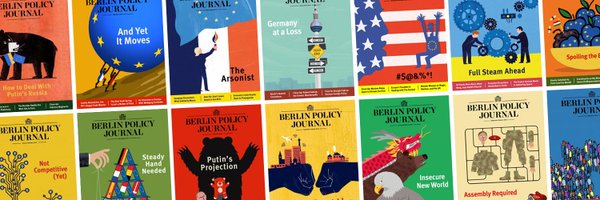
Berlin Policy Journal







